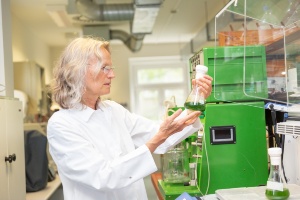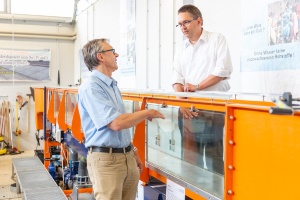Water is usually there in abundance – but not everywhere where it’s needed; and not always with
the quality it should have. Dr. Hedda Sander and the Professors Klaus Röttcher and Artur Mennerich
work in the research area “Integrated Water and Soil Protection” at Ostfalia. In this interview
they talk about how they can can protect our water and how each of us can make a contribution. And
they explain why their research is a beautiful job.
How are things going with our water?
Artur Mennerich: Expressed with some exaggeration, in Germany we live in paradise. We have a
humid climate, so that over long periods of time plenty of new groundwater is always formed. We
only use a fraction of this – for example to get drinking water. This water is of excellent
quality. We can draw it from a great depth and put it into the water networks without a lot of
preparation. But in the surface water and also in the upper groundwater layers we find
anthropogenic influences that show us: Substances that we release into the environment come into
the groundwater at some point. As water economists, it is our job to preserve the natural resource
water in a good condition.
Klaus Röttcher: We realise that we need to deal with issues today that were not an issue
previously. Overfertilisation with too much nitrate and phosphate in groundwater and surface water
is a topic that we have not yet satisfactorily solved. Also we find traces of pesticides and
medications in the water. In general, it takes very long until trace substances in the water have a
negative impact and we can recognise what we are dealing with. So we should already remove all
pollutants from the water today. Or even better: Not let them into the water in the first
place.
Hedda Sander: Because these pollutants and nutrients alter the water quality and can lead to
unwanted algae growth by eutrophication, an oversupply of nutrients. My research is phycology: the
science of the algae. The Harz mountains, for example, are an old mining area. Even today, we have
to deal with the consequences in the form of heavy metals that are detectable in the rivers. We are
currently working on filters to help us cope with this legacy – with the help of algae. Cell
components of them are apparently able to absorb these heavy metals.
How do you get the algae?
Hedda Sander: We have light incubators and photo-bioreactors in order to be able to breed our
own algae on a large scale. Including those that have a particularly high heavy metal tolerance –
we take good care of these. We also get our algae from other collections, such as the University of
Göttingen and the University of Texas in Austin.
Which projects are you currently involved in?
Klaus Röttcher: We are preparing a large-scale project aiming to reduce the water consumption in
the Mekong Delta in Vietnam. If too much water is taken from the ground in coastal regions there,
the sea water finds its way in. This can lead to farmers eventually needing to pump salt water in
order to irrigate their agricultural land. If they don’t succeed in using their water resources
more sustainably, whole areas could be lost.
Artur Mennerich: One of my projects focuses on biological wastewater treatment. We want to
reduce power consumption and improve energy efficiency. Also the use of the energy contained in the
waste water concerns us. The question here is: How can the treatment plant supply itself with
energy to be self-sufficient?
Hedda Sander: I work essentially on inland lakes. In order to be able to monitor the water
quality, we have introduced an app to the market. Using simple measuring data – for example, water
temperature and phosphate content – it is possible to evaluate how much a swimming lake is affected
by blue-green algae. And it can predict how the algae growth will develop in the near future.
Why is that important?
Hedda Sander: The algal blooms of blue-green algae produce toxins. These are organic toxic
substances that can cause serious allergic reactions. In cooperation with our partner, the
University of Wisconsin, we are enhancing the app – in the direction of artificial intelligence. We
want the app to learn with each application.
What do you need in your field of research to move forward?
Klaus Röttcher: It is there in the name of our research area: We need integrated solutions. The
networks we work in are decisive. Only by working together we can implement solutions, for example
in cooperation with the local authorities and water associations.
Artur Mennerich: We need the discussion with other disciplines. And in international projects we
need the close exchange with our foreign partners so that we can understand the requirements and
develop a suitable concept. Systemic approaches play an important role in our research area.
Which developments pose a great danger for water?
Klaus Röttcher: 70 percent of global water consumption is accounted for by food production – and
the proportion is increasing. To feed more and more people, we need more and more water. The global
streams of refugees have something to do with water, too: with the insecurity of the supply and
with the fact that living and environmental conditions are not sufficient. If we do not succeed in
improving the supply, there will be new conflicts.
Artur Mennerich: In emerging and developing countries, it draws many people from rural areas
into the cities, where they hope that things will be better. In a joint project with the
participation of urban planners, we are examining how the infrastructure in fast-growing cities can
grow along with them, so to speak, in order to secure the water supply and disposal.
How can each of us contribute to water and soil protection?
Klaus Röttcher: We must learn not to abuse the water as a route of disposal – for example, for
medicines, paints and varnishes. Treatment plants are designed to separate organic materials from
the waste water. In short: Drugs do not belong in the toilet, chemicals do not belong in the
sink.
Artur Mennerich: We are one of the few countries in the world to have really excellent drinking
water. I recommend drinking more tap water – instead of producing water in plastic bottles and then
throwing the plastic away.
Why do you like the research area and your work?
Hedda Sander: In the summer of 2018, the heat was so great that you could observe how many
streams dried out and our water plants and supply networks ran up against their limits because of
the increased water demand. People were called to avoid washing their cars and watering their lawns
so as not to exacerbate the bottleneck during peak consumption times. Many were suddenly made aware
of how precious our water is. The protection of water is a particularly beautiful job.



